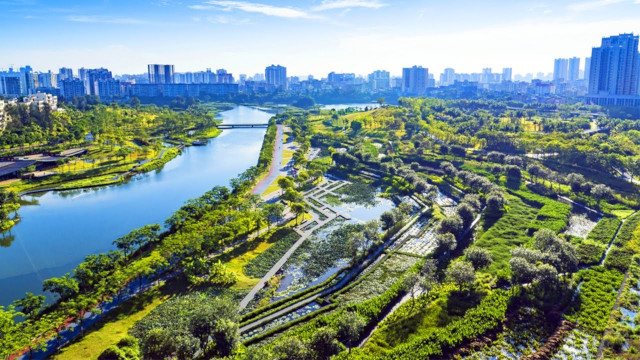Unveiling the Concept of Sponge Cities: A Sustainable Solution for Urban Water Management
Posted on: 09/Dec/2023 12:07:48 PM

Introduction:
Sponge cities represent a revolutionary approach to urban development, challenging the conventional impermeable urban landscape. Unlike traditional cities that repel water, these innovative urban spaces act as sponges, absorbing and naturally filtering rainwater to enhance water sustainability. The implementation of sponge city principles involves strategic urban planning and design to create a harmonious balance between infrastructure, ecology, and water management.
Key Components of a Sponge City:
1. Green Spaces and Water Features:
- - Integration of contiguous open green spaces and interconnected waterways across neighborhoods.
- - Creation of ponds and channels that serve as natural detention and filtration systems.
- - Promotion of urban ecosystems, biodiversity, and cultural and recreational opportunities.
2. Green Roofs:
- - Installation of green roofs that retain rainwater and facilitate natural filtration before recycling or percolating into the ground.
3. Porous Design Interventions:
- - Implementation of bio-swales and bio-retention systems to detain runoff and encourage groundwater infiltration.
- - Incorporation of porous roads and pavements for safe pedestrian and vehicular traffic, allowing water absorption and groundwater recharge.
- - Development of drainage systems guiding stormwater into green spaces for natural absorption.
4. Water Savings and Recycling:
- - Extension of water recycling practices, especially greywater, at the building block level.
- - Incentivization of water conservation through increased tariffs, awareness campaigns, and smart monitoring systems to identify and address water inefficiencies.
Benefits of Sponge Cities:
1. Increased Clean Water Accessibility:
- - Replenishment of groundwater leading to greater access to local water resources.
- - Enhanced water self-sufficiency, reducing dependence on external water sources.
2. Improved Water Quality:
- - Cleaner groundwater resulting from the natural filtration of stormwater, reducing environmental and health costs associated with water pollution.
3. Flood Risk Reduction:b>
- - Mitigation of flood risks through permeable urban spaces that facilitate natural water retention and percolation.
- - Improved resilience against increased flood risks associated with climate change.
4. Cost-Efficient Infrastructure:
- - Reduced burdens on drainage systems, water treatment plants, and natural streams, resulting in lower infrastructure costs.
5. Enhanced Urban Spaces:
- - Creation of greener, healthier, and more enjoyable urban environments.
- - Improved quality of life, aesthetically pleasing landscapes, and recreational areas attracting residents and visitors alike.
6. Biodiversity Enrichment:
- - Promotion of biodiversity around green spaces, wetlands, urban gardens, and green rooftops.
Conclusion:
The adoption of sponge city principles marks a paradigm shift towards sustainable urban development, offering a multitude of benefits ranging from water conservation to enhanced urban living. As cities worldwide grapple with the challenges of water scarcity and climate change, embracing the sponge city concept becomes imperative for building resilient, eco-friendly, and water-efficient urban landscapes.








